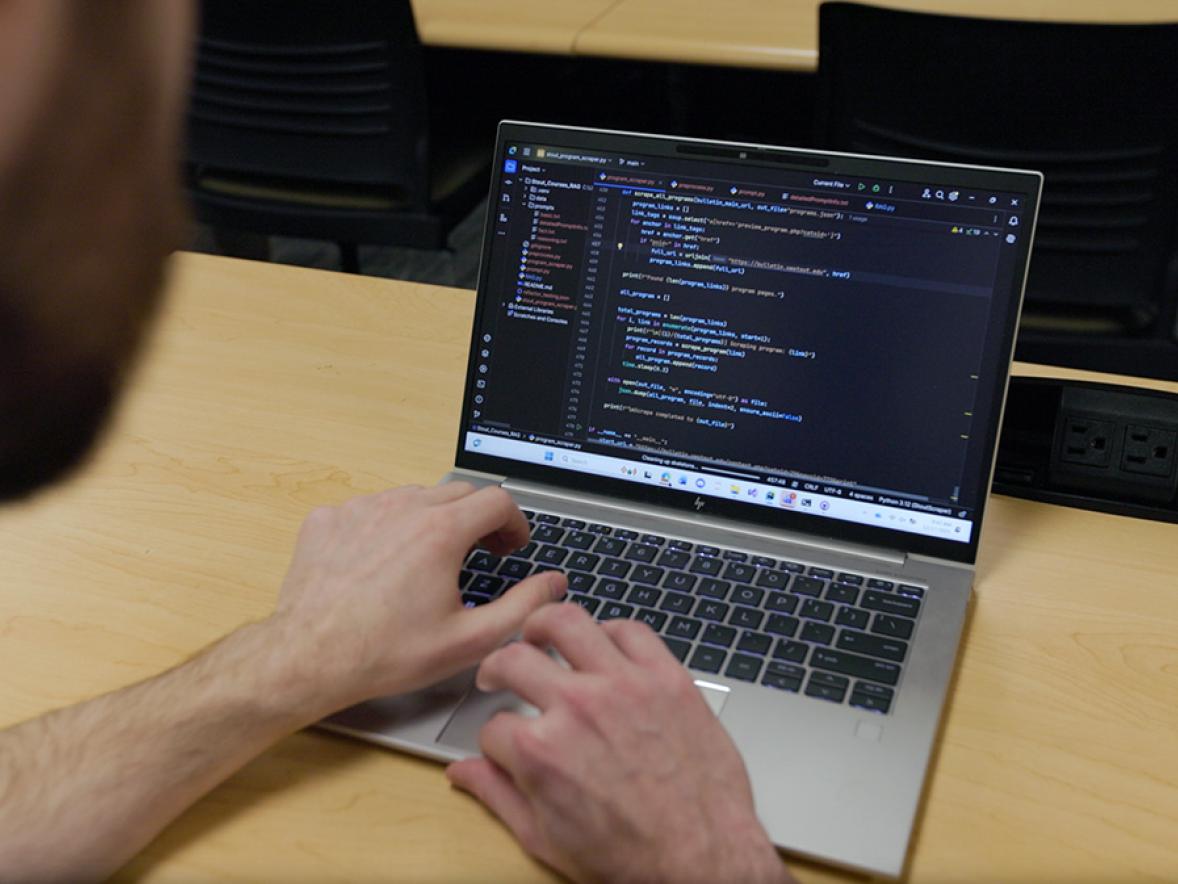Augment the Value of Your Degree with AI
Distinguish your B.S. Applied Mathematics & Computer Science degree with a concentration in artificial intelligence. As industries increasingly integrate AI technologies, the demand for skilled professionals continues to surge. This innovative program will keep you on the leading-edge of industry by preparing you to harness the power of AI and machine learning to solve real-world problems.
Concentration Highlights
Comprehensive Curriculum: Building on a curriculum that blends foundational mathematics and statistical theory with practical applications and programming skills, your concentration classes will include:
- Introduction to AI: Discover core AI concepts and techniques through topics such as intelligent agents, supervised and unsupervised learning, reinforcement learning, search algorithms, industry applications and related ethical considerations.
- Machine Learning: Dive into the algorithms and statistical methods that enable computers to learn from and make predictions based on data through experiences with regression, support vector machines, decision trees, random forests, clustering algorithms, Q-learning, and artificial neural networks.
- Advanced Machine Learning: Delve into the complex topics and common network architectures essential for modern AI applications, including Convolutional Neural Networks (CNNs), Recurrent Neural Networks (RNNs), Generative Adversarial Networks (GANs), Variational Autoencoders (VAEs), Long Short-Term Memory networks (LSTMs), transformers, Deep Q-learning, and more. This comprehensive approach will equip you with the skills to develop and refine advanced machine learning models.
- Image Processing: Examine the intersection of image processing and artificial intelligence by examining techniques associated with Convolutional Neural Networks (CNNs), fuzzy logic, image reconstruction, and object detection. You'll learn to apply concepts using OpenCV, a powerful library for computer vision. By integrating AI methods with image processing techniques, you'll be prepared to create advanced applications that analyze and interpret visual data effectively.
- Applied Regression Analysis: Regression techniques are foundational in statistics and widely used in machine learning to make predictions. Learn the practical applications to derive insights from data and improve decision-making processes.
- Data Mining: Explore techniques essential for extracting valuable insights from large datasets, including data cleaning, dimensionality reduction, normalization, feature creation, k-nearest neighbors, clustering algorithms, and outlier detection. By mastering these techniques, you'll learn to preprocess and analyze data effectively, enabling you to build and enhance AI models that rely on high-quality, well-structured information.
Hands-On Learning: Practical experience is a fundamental part of our program. As a laptop-based campus, our students program during classes alongside their professor, allowing for immediate application of concepts and hands-on experience.
Interdisciplinary Approach: AI faculty fellows from across campus work to identify collaborative opportunities, develop new courses, and integrate AI into UW-Stout's existing curriculum. This comprehensive approach is designed to expose you to AI from multiple perspectives and prepare you to apply AI in a wide range of contexts.
Industry Connections: UW-Stout has strong ties with local and national companies. Through internships and cooperative educational experiences, career fairs, networking events and guest lectures, you’ll have ample opportunities to connect with professionals and gain insight into the industry landscape.
Request Information
Applied Learning & Research Projects
The development of creative and innovation solutions to real-world challenges is core to our machine learning and image processing curriculum, and our students have amassed an impressive array of outcome-driven projects.
- Blood Sugar Prediction: Used Artificial Neural Networks (ANNs) to predict blood sugar spikes based on data collected from continuous glucose monitors, aiding individuals in managing their health.
- Music Continuation: Created a recurrent neural network (RNN) to generate seamless music continuations, allowing for innovative compositions and creative exploration in music.
- Handwritten Text Generation: Developed a Variational Autoencoder (VAE)-based generative AI model that produces text that resembles handwritten notes, showcasing the capabilities of generative models.
- Playing Card Identification: Developed a YOLO-based network to accurately identify playing cards in images, enhancing gaming experiences through AI-driven recognition.
- Fuzzy Systems for Color Replacement: Designed a fuzzy logic system to intelligently replace colors in images, offering improved aesthetics and customization options.
- Song Playlist Recommendation: Created a playlist recommendation system inspired by word2vec, utilizing techniques inspired by natural language processing to suggest songs based on user likes and dislikes.
- Song Genre Identification: Implemented a Convolutional Neural Network (CNN) to classify songs by genre using spectrograms, leveraging audio data for effective genre detection.
- Astrophotography Visualization: Applied false color techniques to enhance the visualization of astrophotography images, improving clarity and detail for astronomical studies.
Graduate in Demand and Ready to Do More
Within six months of graduation, 100% of B.S. Applied Mathematics & Computer Science graduates were employed (2022-2023) with an average starting salary of $70,000. Our alumni work in diverse fields, including software development, cybersecurity, actuarial science, education, and business analytics. As AI continues to transform society, graduates with an AI concentration will further expand their career and academic avenues in healthcare, finance, manufacturing, entertainment and more by leveraging their expertise on top of a solid foundation in mathematics, statistics, and computer science.






